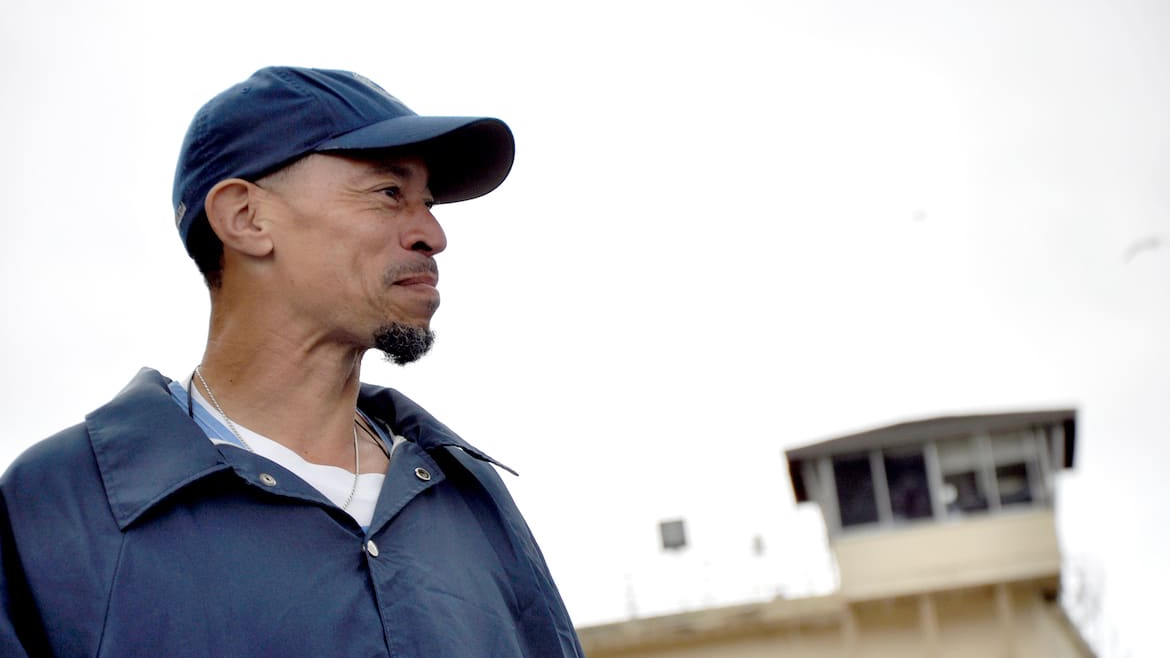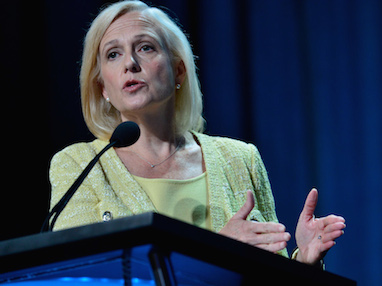Governor’s decision gives ‘Ear Hustle’ host a chance at freedom

Eddie Herena
Rahsaan "New York" Thomas
I got the update standing in the phone booth on the first tier of North Block Nov. 12 at San Quentin State Prison, where I am incarcerated. This prison is also where I help produce and host the Ear Hustle podcast.
“Your case came out of the California Supreme Court yesterday,” my friend Roc told me.
She referred to a commutation application that California Gov. Gavin Newsom forwarded to the state Supreme Court for review.
The review process was necessary under California law before the governor can grant a commutation for anyone who has a previous felony conviction. It applies to me because I have a prior from 1989.
I had been waiting for this step since June, when a parole board en banc panel first weighed in on the commutation request in the affirmative. Now the final step was the governor signing off.
It’s a process I’ve seen happen over and over to other guys I’ve completed rehabilitative groups with and worked with on media projects.
They were all summoned to the captain’s porch, a suite of offices for the brass, where they took a call from someone at the governor’s office. Most of them were told that their case was being advanced to the next available parole board for a hearing, which takes about six to eight months to be scheduled. If found suitable, they actually walked out the prison doors 150 days after the hearing.
A lucky few were commuted to immediate freedom — seven days later, they returned to society. That’s what happened with Ear Hustle co-host Earlonne Woods, and that’s what I hoped would happen to me even though we have different cases. He was a three-striker convicted of attempted robbery; I stand convicted of murder and attempted voluntary manslaughter.
“Hey, Roc, read me what it says about the application,” I asked, hoping for clues as to which way my case would go.
Roc relayed that the governor requested the court’s review because he was contemplating commuting my sentence to see a parole board early. I took that to mean going through the parole board process when the commutation happened, and I started to prepare for the hearing.
Then on Nov. 13, the San Francisco Chronicle dropped an article about the California Supreme Court clearing the way for Gov. Newsom to grant the commutation. It called me a murderer turned journalist, inmate and school shooter.
The language in the story echoed in my head, especially “school shooter,” which in today’s usage means “mass murderer.” What I did — assaulted one person with a gun during a dispute on a college campus — was bad enough and needs no hyperbole. Additionally, calling me a murderer made it sound like an ongoing career choice instead of the worst thing I’ve ever done.
A copy of the story about “redemption” showed me that the reporter’s language was not well received. Our of the 16 comments, 15 were negative.
Every day since Nov. 14, I waited for the governor’s call. December came, and still no summons. I began to consider that the governor read the article and changed his mind.
Then in November, burglars targeted Bay Area stores in a series of brazen robberies. I watched the footage in horror on a 15-inch TV set hanging over the top bunk in the cell assigned to me, knowing that it couldn’t be a good look for releasing people early.
Newsom went on Good Morning America and laid out his plans to stop the retail thefts. I took comfort in that he said we don’t need new laws, we need to enforce the ones we have.
Still, no call came from the governor’s office before or after Christmas.
On Dec. 28, I called home, and my mother answered the phone sounding terrible. She had a bad cold, which I could hear in her voice. All I could do was pray it wasn’t COVID.
Every day I raced out of my cell when they released us for chow to get on the phone line, which is often 40 to 70 people long and right next to a pill call line about 50 long. Just outside an open heavy metal door, there’s a chow line with 100 people waiting. Every day I hoped to make it to the front of the phone call line and sign up for a 15-minute call later in the day before they ran out of slots and before the prison stopped serving chow. Most days I’m able to receive a call and make it to breakfast. Some days I have to pick one or the other. Worried about my family, I called home every other day I could get a call at a decent time.
On Jan. 9, the California prison system started a statewide 15-day lockdown to beat the spread of the newest COVID variant. People at San Quentin were showing symptoms of what could have been the omicron virus, but no one needed medical help.
On Jan. 10, I found that COVID had hospitalized my stepfather. My mother vented about the hospital drama and my step-pop Nat’s condition during our call. A prerecorded voice interrupted to say, “You have one minute.”
I heard my mother sigh. I could hear her frustration with the time limit.
Meanwhile, I stopped waiting on the governor’s call, fearing he must have changed his mind.
On Jan. 13, I heard “Thomas, report to the desk” come over the loudspeaker in North Block. I was locked in my cell at the time, as a wave of hope went through me.
I put on my prison blue uniform over gray gym shorts and a T-shirt and waited anxiously by the cell’s front gate for the hourly unlock at 11 a.m. As soon as the doors opened, I shot out of the cell wearing a blue N95 mask and bounced down five flights of steps to the flats. Past the rows of showers, to the podium where four or five corrections officers sat, and to the desk officer I went.
“You call Thomas cell 5-69 for something?”
“Thomas, Thomas — oh yeah, report to your counselor.”
Everybody else who got a commutation was told to report to the captain’s perch, so I wasn’t sure what my counselor wanted. I walked around the front of basically a warehouse of cells stacked on cells and turned the corner to a row of offices for officers and counselors across from a rear row of cells. I found the only counselor on duty, a woman I’ve never seen before, in an office using the phone. Her door is closed, but I can see her clearly through the two-foot window on the top half of the door.
She spotted me and held up a finger.
A few minutes later, she motioned me into the office. “You have a call scheduled for 1:15 with Sacramento. You know what it’s about, right?”
“I think a commutation.”
“Yeah, you’re one of a few he’s doing today. Come back at 1 for the call.”
At 1:05, I held my ear to the phone as Ashley from the governor’s office delivered the news: “Your sentence has been commuted to see the parole board.”
“Thank the governor for me and tell him I’m gonna make him proud. Violent crime will go down at least 3% once I’m home.”
Ashley laughed. I thanked her again and ended the call quickly, eager to tell my mother.
The counselor allowed me 10 minutes to deliver the good news.
“Ma, it’s official. My sentence was commuted two minutes ago,” I said.
“So what does that mean?”
“I still have to go see a parole board and it’s a slow process, but if things go well I’ll be home next year.”
“Okay, that’s great. Well, I sent your birth certificate already.”
“Ma, but how’s Nat?”
“He’s doing better now, but they tried to send him home in an ambulance,” she said. “I told them, he walked in and I’m not taking him back until he can walk out.”
“That makes sense.”
“I’m not sure but I think I used the B-word talking to that nurse and …”
I could see my counselor just outside the office window, signaling my time was up.
“Ma, I gotta go.”
“Oh, well okay, bye then.”
“Hold on, I just want to first say I love you and give Nat my regards.”
“Love you too, bye.”
Now I’m preparing for the parole board, which can either grant me a release date about 150 days after the hearing or deny me parole until another hearing 3, 5, 7, 10 or 15 years later. Four people I know who received commutation under Gov. Jerry Brown were denied at their initial parole board hearings, so a commutation isn’t a get-out-of-jail-free card. It’s an honor and a chance to plead my case for parole sooner than my current parole board date of 2030.
I’m going to make the most of this chance.






